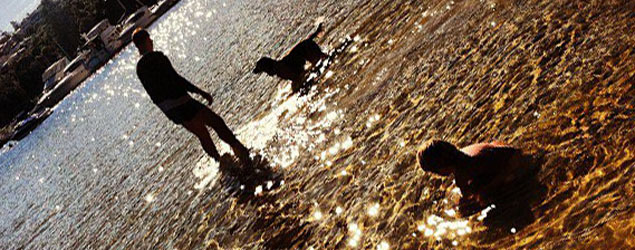Council Rangers, if they deem you have committed an offense, can ask you for your personal details, but not explicitly insist on sighting physical ID. They can, however, insist on scanning your dog’s chip, so they can indirectly ID you. In my ignorance, I thought this was exclusively a police power. If you either refuse to give them your name and address, or, let them scan your dog’s chip, then they can arrest you. Isn’t that another prerogative of the police? I guess not; they wield police powers without the full police training.
I’m a (relatively) responsible dog owner and still have managed to have had a few chats with Council Rangers over Teddy’s inhuman behaviour. The last instance being his anti-social behaviour of running into an unfenced playground frantically looking for my 2 baby children, being instantly called to heal and leashed, but still given a $330 slap on the wrist for Teddy’s disturbance of the peace. $330 is the minimum fine applicable for such an offence.
Fair is fair, the law says dogs are not allowed in kids areas. Let $330 be a warning to me that Teddy might go on an unexpected, search-and-rescue mission at will and, in so doing, significantly upset the public.
A few months back, a pair of council rangers, from the same park, witnessed a pair of rottweilers savage a Labrador and when the poor Lab’s mum tried to extricate the canine mess, she got her hand gouged for her troubles. The rotties’ owners claimed to the spectating rangers that the Lab attack their dogs. My horrified friend interceded and also attested that the reverse was the truth. In addition, she specifically also asked the rangers to get the details of the rotties’ owners. The rangers shook their heads and refused.
To be fair, if I were the ranger in the same position, I would do the same. It’s in the too hard bucket. Questioning, these less “responsible” owners and trying to fine them could be deemed a big, and confrontational, ask.
If your misdemeanour, however, is not in the “too hard bucket”, the council rangers have an obviously, well rehearsed, plan of inquiry: “Is this your dog? Can we check the chip? What is your name and address? By the way we are now fining you $330.” A $100 fine hurts, well try a minimum $330 for remembering to be responsible next time.
If, like myself, you would like to know your citizen’s rights, then a quick Google and even visits to NSW council websites may prove remarkably, and surprisingly, fruitless. A visit to the slightly less well-known, AustLII, will bear more fruit, however. For the layman, like myself, that has previously never heard of this helpful, free resource provided by UTS and UNSW Faculties of Law, here is the Companion Animals Act:
COMPANION ANIMALS ACT 1998 – SECT 69G
Requirement to state name and address
69G Requirement to state name and address
(1) An authorised officer who reasonably suspects a person of having committed an offence under this Act or the regulations may require the person to state his or her full name and residential address.
(2) A person must not:
(a) fail to comply with a requirement under this section, or
(b) in purported compliance with such a requirement, furnish a name that is not his or her name or an address that is not his or her residential address.
Maximum penalty: 15 penalty units.
(3) A person is not guilty of an offence under this section unless it is established that the authorised officer warned the person that a failure to comply is an offence.
(4) If an authorised officer suspects on reasonable grounds that a person has committed an offence under this section, the authorised officer may, without a warrant, arrest the person.
(5) An authorised officer who arrests a person under this section must, as soon as is reasonably practicable, take the person before an authorised officer (within the meaning of the Law Enforcement (Powers and Responsibilities) Act 2002 ) to be dealt with according to law.
See also:
Power to ascertain identification information of companion animals
69E Power to ascertain identification information of companion animals
(1) An authorised officer may, at any time while in a public place, take such steps as the officer considers necessary in order to ascertain the identification information of a companion animal (including scanning the animal).
(2) The authorised officer may do so only:
(a) if the officer reasonably suspects that an offence under this Act or the regulations in respect of the companion animal has been committed, or
(b) in the case of an authorised officer of a council, for the purposes of exercising the council’s functions under Division 6 of Part 5.
(3) This section does not prevent companion animals that have been lawfully seized, secured or detained by any person (including an authorised officer) under this Act from being scanned after they have been seized, secured or detained.



Hello
This is misleading. Council rangers do not have the power to arrest unless they are also a Special Constable under the NSW Police.
A ranger can request your identification just like any other human, but not showing or providing your details is not an offense.
The term authorised officer is a representative of the NSW Police, not a council ranger or a parking inspector.
You are 100 % correct Steve council rangers do not have any power to arrest a dog owner for not complying with their requests. Under WHS 2012 legislation which council has to adhere to, a council ranger would have to hold special constable status (which has been put on hold) and would have to be trained to arrest and carry appointments, which will never happen! In short
a dog owner can simply walk away full stop. And if the ranger tries to get to your dog and any part of their body touches the dog owner then this constitutes common assault S61 NSW Crimes Act and can be reported to Police. Council rangers have to adhere to the Law in NSW just the same as anyone else, and following anyone back to their vehicle especially females is also an offence, and if proven the council ranger would be in a spot hot water to say the least…
Look at the definition within the ACT
5 Definitions
(1) In this Act—
authorised officer means—
(a) an employee of a local authority authorised by the local authority for the purposes of this Act, or
(b) a police officer.
Authorised officer means officer authorised by in rangers case general manager to enforce Companion Animals Act. Nothing to do with special constable status which rangers don’t now have. But ranger wouldn’t arrest as they don’t have equipment to effect arrests. They can though
Brett you might want to check your facts rangers are not police and are not allowed to hold a person who has refused to comply with your council revenue raising exercise… Because you know that rangers are not police and are not trained to arrest, and if I catch any ranger carrying hand cuffs or batons you will be prosecuted under the NSW Crimes Act full stop.
Read section 352 of the crimes act fellas, “any constable OR OTHER PERSON etc…”
Ah Andrew Section 352 relates to summary and indictable offences, having your dog off the lead is not a summary or indictable offence mate…
Like you lot (above) I am not a lawyer, not a ranger. I googled “does a ranger have arrest powers” ? This page is a disservice to the internet because it came up on page 1 of search results (I’m located in NSW)
So, I went elsewhere, read the law and a few lawyers guides relevant to your state (essential context actually, do look them up!)
MY CONCLUSIONS (not advice)
1. The title IS misleading. 2.A Ranger does NOT police arrest powers, are mostly NOT sworn Special Constables, (most have been cancelled, often only as armed security for government buildings, but can also be ranger or RSPCA worker, but they MUST wear uniform and have ID).
All of your comments (and debate) ignore a simple arrest power WE ALL HAVE, when witnessing an actual crime or serious offence happening or need to stop an ongoing office. We all above CITIZENS ARREST POWERS.
Don’t get excited now.
You need to understand a few nuances if you plan on arresting anyone (see YouTube title to watch is “Respect My Authority! – SOUTH PARK”
But, to get serious again, regarding the misleading (above) title “no but yes we all do, in a limited way”
Legal source. S100. Law Enforcement (Powers and Responsibilities) Act 2002 No 103 (from https://legislation.nsw.gov.au/view/html/inforce/current/act-2002-103#sec.100 )
Strongly Suggest YOU:
…you look at a few lawyers guides , as they are helpful if you plan on making an arrest. You will want to avoid getting yourself in trouble or depriving them of their rights … By unlawfully detaining them, assaulting them, and outright not understanding the legal difference between REASONABLE SUSPICION and REASONABLE BELIEF …and that it’s got to be fairly serious stuff, or harm being done/prevented for the courts to accept you needed to actually arrest the person. Juts seeing someone break any old law isn’t necessarily grounds to arrest and detain.
And anyway, you just detain then until I cop can get there…. I won’t bore you with the details. But yeah.
Oh and it’s far simpler to understand all of this stuff in the ACT where the is an easy to understand PDF. Look it up. Nice.
It’s annoying that there isn’t a simple one stop easy to find source of this for NSW, and Australia generally. We can’t argue ignorance of the law. But to understand the nuance requires quite come consideration and education and research.
So it goes…